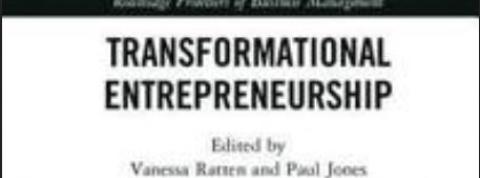
Individual innovativeness, entrepreneurial creativity and religious capital: The role of transformational entrepreneurship in Tunisia
Waleed OMRI
Executive summary
Despite the broadly acknowledged importance of innovation at the individual level in the establishment of successful ventures, the literature lacks evidence on how managers can effectively harness their skills and knowledge in the workplace. The existing literature illustrates that religion can impact the day-to-day work behavior of entrepreneurs, managers, and employees (Henley, 2017; Judge and Douglas, 2013). Other scholars have argued that religious beliefs and practices could affect daily entrepreneurial activities by fostering mental abilities and traits such as creativity, intelligence, and self-efficacy (McCleary and Barro, 2006; Omri and Becuwe, 2014). In the present study, we define religious capital as a set of personal and intangible resources, skills, and competencies that emanate from an individual’s religious values, beliefs, practices, and experiences and may be used to increase the quality of economic activities. Religious ethics and practices have been linked to various positive employee outcomes in terms of organizational change, job satisfaction, and entrepreneurial intensity (Dana, 2009; Sabah et al., 2014; Yousef, 2000, 2001). As investigations of their consequences beyond direct task performance are still scarce (Ireland et al., 2009), we explore if religious capital plays a role in managers’ innovative behavior.
This study makes at least three contributions to the literature. First, religion has often been identified as a major antecedent of various entrepreneurial activities, yet the discussion on how and why it affects individual innovative behavior remains limited (e.g., Kumar and Che Rose, 2010; Neubert et al., 2017; Omri and Becuwe, 2014). To the best of our knowledge, no study has endeavored to theoretically and empirically establish the effects of religious capital on entrepreneurial creativity and innovative behavior in the workplace, even though one of the main motivations for studying religious beliefs is its determining role in affecting primary workplace goals and outcomes. Second, our study expands on the existing literature (Dorenbosch et al., 2005; Scott and Bruce, 1994) by identifying creativity as a cognitive ability that is not only affected by religiosity but also mediates the relationship between religiosity and innovative behavior. By examining these direct and indirect relationships, this study responds to some of the calls made in the individual entrepreneurship literature (Dana, 2009; MacPherson and Kelly, 2011) to explicitly model the direct effects of individual innovative antecedents and mediated effects through entrepreneurial creativity. Given the important role of creativity in changing a company’s entrepreneurial behavior, the tendency among managers who use religious criteria to promote entrepreneurial creativity can be considered a path to successful innovation. Finally, our research also responds to the call for greater attention toward Muslim-majority countries. Our Tunisian sample offers external validity for the theorized relationships in this study.
We test our hypotheses using data gathered from 289 Tunisian small businesses. No direct relationship between religious practices and innovative behavior among population has been found. Rather, we find that religious practices matter only if managers invest considerable time developing their creative abilities. We also find that managers who are highly sensitive to religious work ethics are likely to be more creative and skilled at problem solving. Nevertheless, these findings do not indicate that the religious faith determines creative personality and innovation – the associations we find are nothing more than predispositions – but they point to the value of considering the role of religious beliefs and practices in entrepreneurial activities. Our study also complements other approaches in exploring the role of organizational culture in creativity and innovation. Previous studies have shown that religion (Emerson and Mckinney, 2010; Yousef, 2000) plays a role in both creativity (MacPherson and Kelly, 2011) and innovation orientation (Kumar and Che Rose, 2010; Sabah et al., 2014). Our study does not challenge the importance of either religious ethics or practices in creativity or innovative work behavior. It merely follows Drakopoulou Dodd and Seaman (1998), who argue that to truly explain entrepreneurial behavior, one must also delve deeper into understanding people’s way of life, particularly their religious capital.

